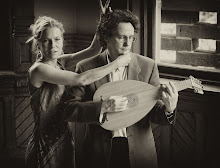This is how we bring you the latest old stuff. Our concert on Oct. 6th is all about music for Henry Stuart.
Angelo Notari was an Italian who worked, for a short time, for Henry, Prince of Wales who was the eldest son of James I of England, VI of Scotland. Now, it's a shame Henry died of typhoid only a year after setting up his own household, because the musicians in that household were the avant garde of musicmaking. And since the Italians were the inventors of the new music Henry's music had to have an Italian in it. And that was Angelo Notari. There is a manuscript in the British Library which is in Notari's handwriting that includes many songs, some arrangements for one voice of madrigals originally for four or five voices and, very importantly, what appears to be the first music for solo violin in England. There had been a violin consort at court since Henry VIII's time of course (see previous blog entry) but this music is for one violin and continuo.
The University of Toronto Faculty of Music library has a microfilm of Notari's manuscript and after valiant efforts by, at one point, four staff memebers led by Bryan Martin, we tracked it down and I took it over to the EJ Pratt Library, and with Northrop Frye looking down on me as he flies through space, I set up the microfilm on the reader that then took pictures of the page you see on the screen and makes a jpeg of them. See the setup above.
Notari specifies 'tiorba' for acoompanying the voice on his book of music for 1-3 voices published in 1613, but in the manuscript is this ciaccona for once voice with a bass, but there appear to be alfabeto 'E-Z' guitar chords over the singing part.
This is a set of divisions for violin on the 'Ruggiero' chord changes. The music is written across the two pages of the opening and you are only seeing the left hand page.
It's very nice to have these pieces as they don't seem to be published in editions and look very cool. Come to the concert as it is very likely you won't get a chance to hear them anywhere else ever.




